Introduction
In the evolving world of real estate and business deals seller financing stands out as a valuable tool that can revolutionize how buyers and sellers interact. This fresh approach empowers sellers to play a role in the financing process giving buyers the freedom they require to attain ownership without being tied down by traditional bank loans. Considering the nature of financial arrangements having a grasp of the fundamental principles and advantages of seller financing is crucial, for those aiming to navigate this landscape effectively.
By delving into the details of loan contracts and bargaining tactics while debunking myths along the way this piece aims to empower its audience with the necessary know how to make the most of seller financing setting the stage for seamless deals and expanded possibilities, for advancement.
Introduction to Seller Financing: Key Concepts and Definitions
[Seller financing](https://forbes.com/advisor/mortgages/owner-financing/) is when the seller offers assistance to the buyer for acquiring a business or property instead of the buyer relying solely on a bank loan for funds. Repayment directly to the seller in installments is customary in this arrangement. Here are a few important points to consider:
-
Loan Agreement: This document details the conditions of the loan such as interest rates and repayment plans.
-
Advantages of Seller Financing:
It's important for both sides to grasp these terms so they can bargain well and make sure the transaction goes smoothly.
Through an expert evaluation procedure, Robbins Pellegrino assists in harmonizing the company's capabilities with market conditions. Such an approach proves essential in setting sales objectives and allowing participants to navigate through the complexities of monetary arrangements and escrow with confidence. Moreover, expert assessment provides insights into the company's worth, which is essential for establishing appropriate funding terms and attracting potential purchasers.
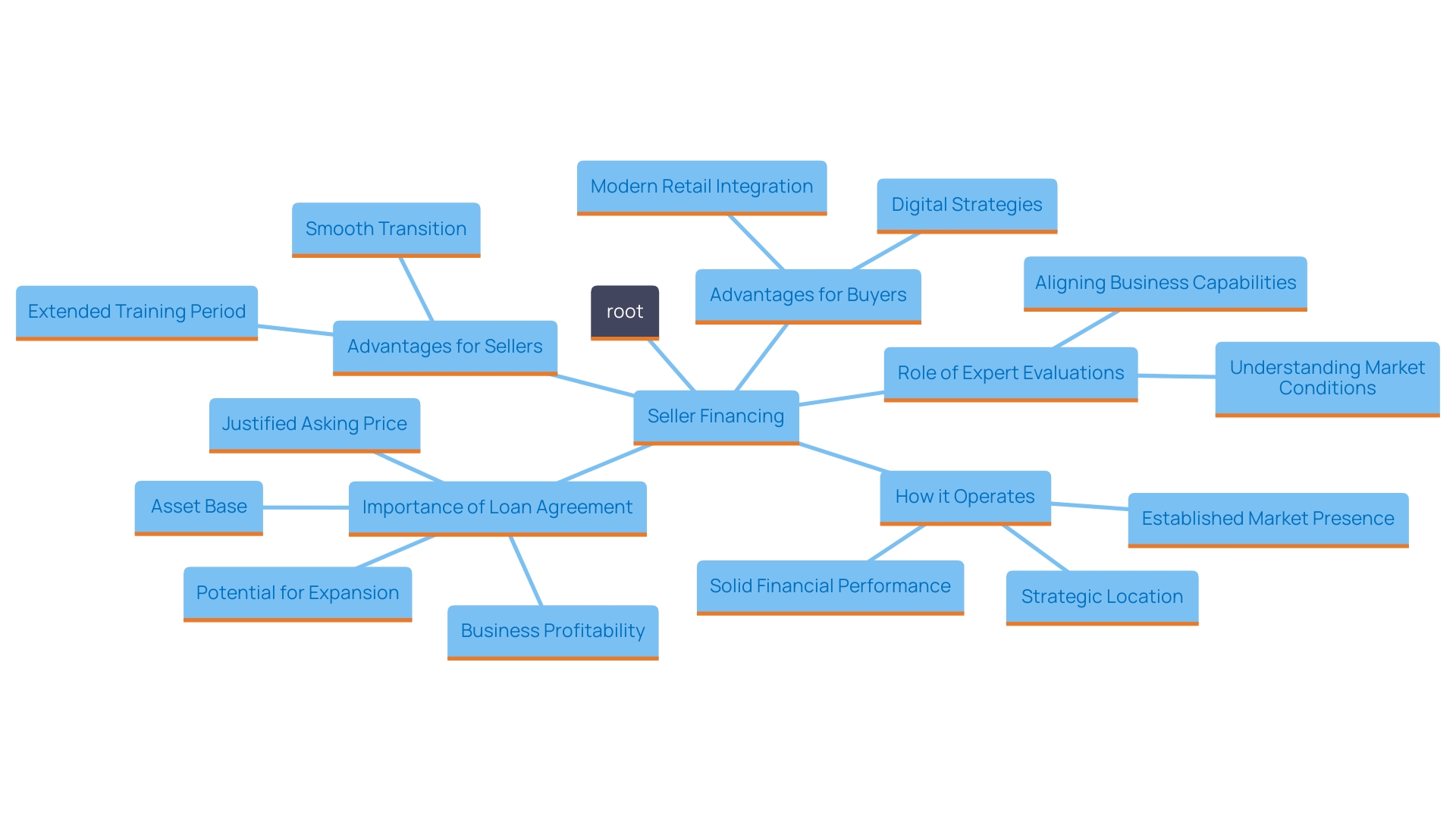

Introduction to Seller Financing: Key Concepts and Definitions
[Seller financing](https://forbes.com/advisor/mortgages/owner-financing/) is when the seller offers assistance to the buyer for acquiring a business or property instead of the buyer relying solely on a bank loan for funds. Repayment directly to the seller in installments is customary in this arrangement. Here are a few important points to consider:
-
Loan Agreement: This document details the conditions of the loan such as interest rates and repayment plans.
-
Advantages of Seller Financing:
It's important for both sides to grasp these terms so they can bargain well and make sure the transaction goes smoothly.
Through an expert evaluation procedure, Robbins Pellegrino assists in harmonizing the company's capabilities with market conditions. Such an approach proves essential in setting sales objectives and allowing participants to navigate through the complexities of monetary arrangements and escrow with confidence. Moreover, expert assessment provides insights into the company's worth, which is essential for establishing appropriate funding terms and attracting potential purchasers.


Essential Insights on Seller Financing Promissory Notes for Buyers and Sellers
In real estate transactions where the purchaser obtains funding from the provider directly through a promissory note agreement, it plays a role in outlining the repayment terms clearly and transparently between both parties involved in the deal. It is important to detail aspects such as:
- The loan amount provided by the vendor to the recipient
- The repayment schedule in installments according to an agreed upon schedule
- Specifying interest rates
- Any penalties for late payments that may apply
According to Clayton Lee Lovett's perspective, financing from the vendor can sometimes act as a component facilitating successful negotiations leading to a finalized contract agreement. It's important for buyers to understand the payment terms thoroughly and the consequences of not meeting their loan obligations; similarly, those providing the goods should clearly explain their rights if the buyer fails to fulfill their responsibilities.
Including clauses that cover:
- Prepayment options
- Outlining procedures for business sale or transfer
is crucial. Research indicates that several providers tend to overlook expenses associated with creating and discussing loan agreements, along with security measures that could influence their financial outcomes.
One example is a real life scenario involving consulting experts for vendor funding that demonstrates how vendors can delay acknowledging profits from assets they have sold by making informed choices. The chance for teamwork and shared achievements is evident in these agreements, which help streamline the transaction process and encourage partnerships.
By embracing provider funding, you can transform your commercial interactions. Open up avenues for significant expansion and accomplishments. In a research study, it was discovered that companies utilizing vendor funding were able to close sales 30 percent quicker than those who did not apply this method, highlighting the success of this strategy.
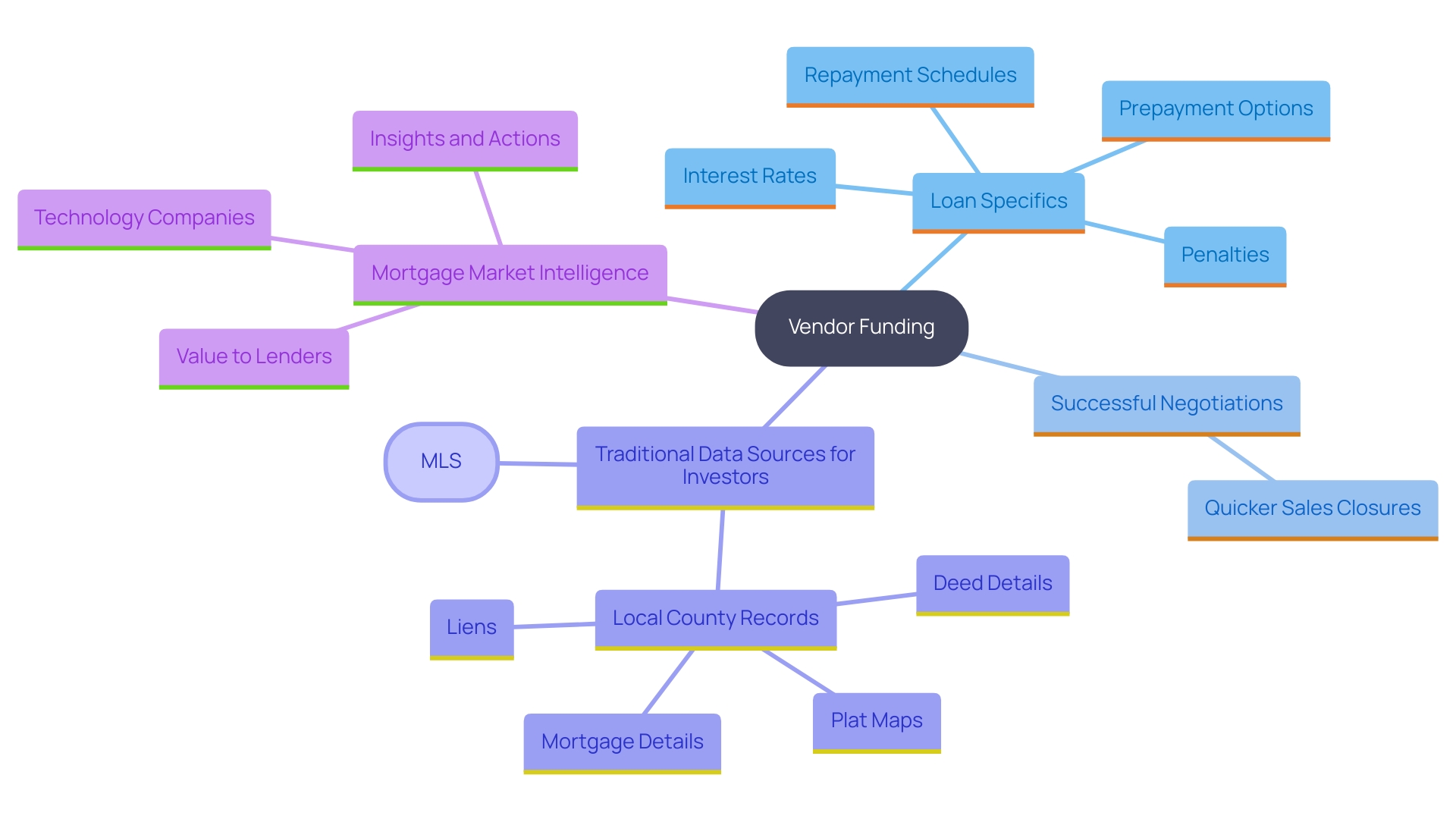
Benefits of Seller Financing for Small Business Transactions
Owner funding offers an opportunity for entrepreneurs by providing them flexibility in terms and conditions that can be modified to meet the unique requirements of buyers and vendors alike. This tailored approach enhances the attractiveness of a sale.
- Captures a broader array of prospective purchasers—particularly those who might not satisfy the requirements for traditional funding options.
- Data shows that companies utilizing vendor funding often experience a 30 percent increase in transaction completion speed, making it an appealing choice for providers aiming to accelerate their sales process.
- Moreover, individuals can enjoy a flow of income from interest payments, which helps to enhance financial stability.
- Purchasers also stand to gain from vendor support by having access to lower down payments and favorable loan terms compared to traditional loans, thus making property ownership more attainable.
An intriguing example, from 2024, demonstrated how a small retail operation was able to sell by providing vendor support, resulting in a sale price that surpassed expectations by 15%. Selling with vendor support simplifies closing deals by reducing the involvement of parties and accelerating transactions without unnecessary complications.
However, it's vital for both parties to involve experts to clarify payment duties, taxes, and insurance obligations clearly. Understanding these responsibilities empowers buyers and sellers to confidently navigate commercial dealings, making decisions that align with their financial aspirations and future plans effectively.
Real estate attorney Erica Crohn Minchella articulates it effectively when she states that 'If an individual is unable to comply with that requirement now they have an option.' Utilizing the opportunities presented by seller financing can turn transactions into a route to achieve success.
At Robbins Pellegrino we begin our involvement with an Expert Valuation process that examines financial details and aligns your company's capabilities with market conditions to establish practical and attainable sales goals for the best results. Utilizing our unique connections enables us to strategically promote your business to suitable clients who are already pre-screened. Guaranteeing impactful visibility that frequently results in faster and more attractive offers being made available to you promptly!
Should you be interested in exploring the benefits of vendor funding, how it could suit your needs perfectly well at this time or in the near future? If so, feel free to get in touch with Robbins Pellegrino without any hesitation straight away!
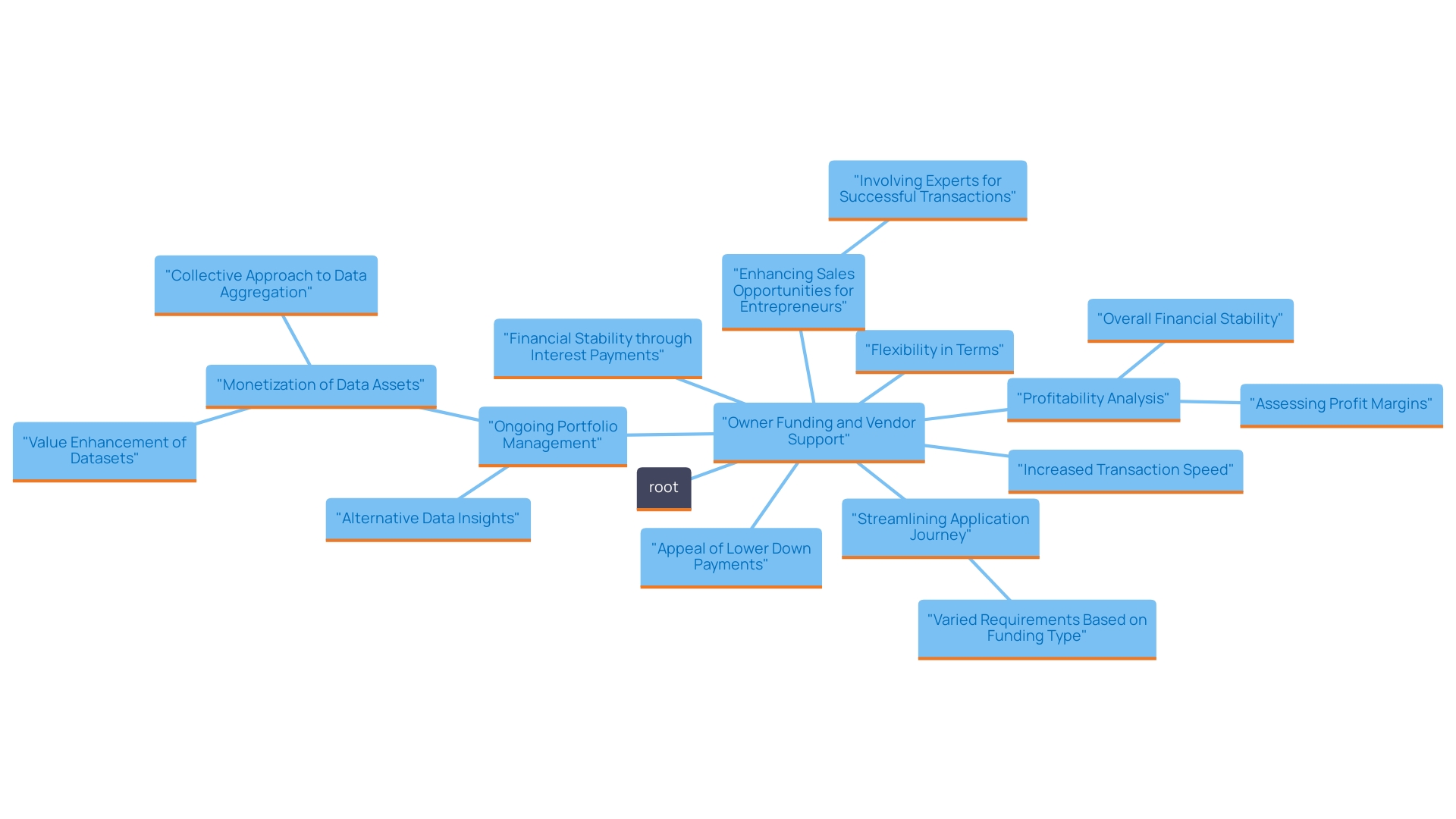
Common Misunderstandings about Seller Financing
One prevalent misconception regarding vendor assistance is the notion that it solely advantages purchasers with credit scores. In fact, financing through the provider can be an option for individuals who are financially stable but desire terms more flexible than what traditional loans offer. This flexibility advantages both purchasers and vendors, generating opportunities for transactions to occur.
Furthermore, there are concerns among vendors regarding the dangers of defaults in transactions. Although every financial deal carries its risks, thoroughly screening purchasers and setting out clear contract terms can help alleviate these worries significantly. Financial expert Sharad Mehta observes that in today's market mortgage lenders generally seek a credit score near 620 and a down payment of 3% or more to authorize a loan, highlighting that purchaser eligibility remains robust in transaction scenarios. Sellers can make the transaction process smoother by being proactive in safeguarding their interests.
It's important for both parties to grasp the significance of the due diligence period in a business transaction process. This crucial stage enables purchasers to validate the information about a business and prepare for any deal breakers. Sellers also stand to gain during this phase by having the chance to tackle any issues that could arise and enhance trust.
Additionally, concerns about being required to manage a loan for a duration can be alleviated with vendor support since it typically accelerates sales processes and allows vendors to receive payment sooner than anticipated. Though there is a possibility of non-payment by the buyer, this risk can be reduced by choosing buyers and including protective clauses in contracts; the benefits generally surpass the potential disadvantages. To address these misconceptions and comprehensively assess the associated risks from all perspectives, both buyers and suppliers can engage in vendor support with a sense of confidence, prepared to make strategic decisions that benefit all parties involved.
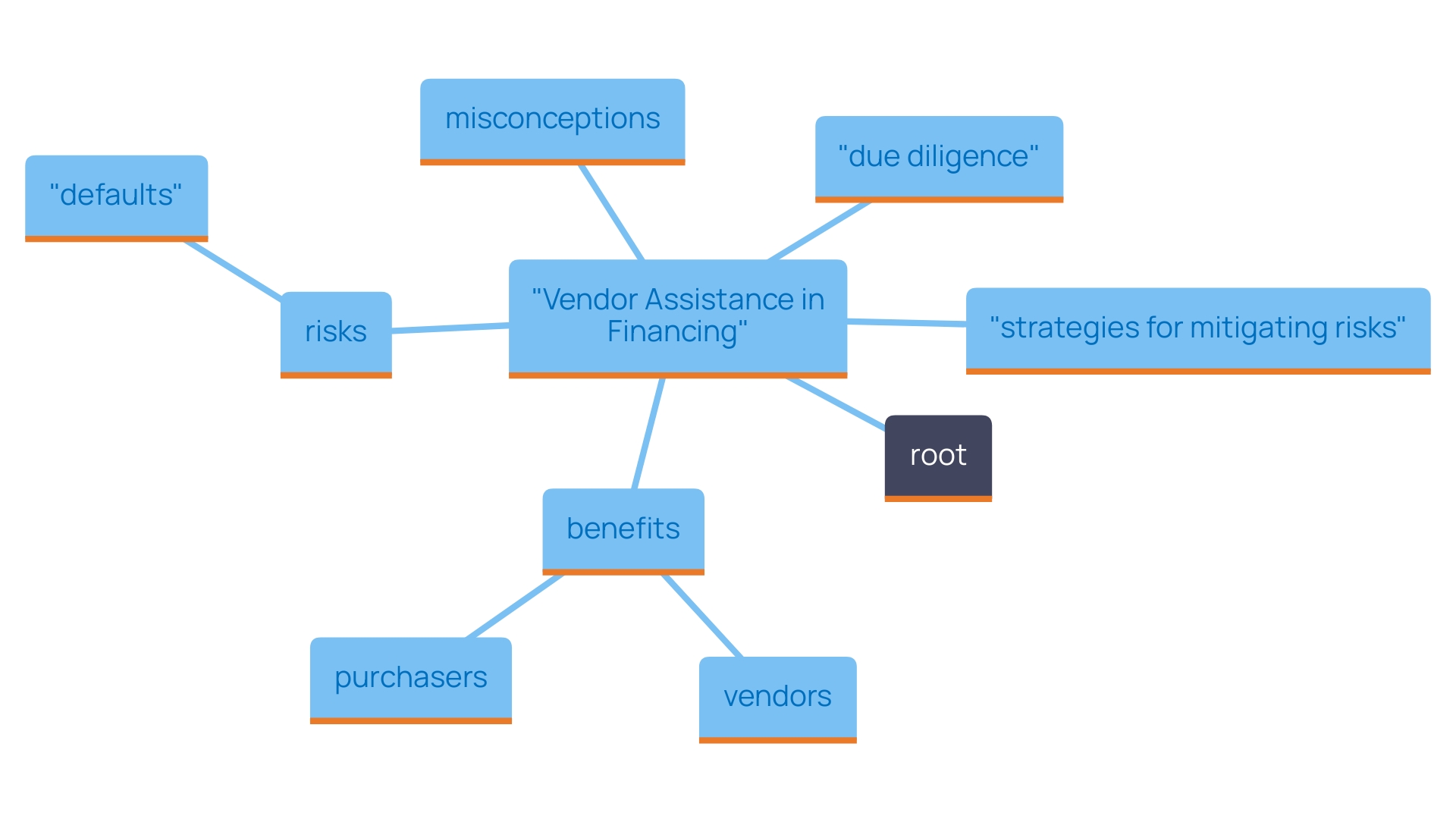
Steps to Negotiate Seller Financing Terms
When discussing financing terms with someone when purchasing a property without a mortgage is an empowering process that relies on good communication and understanding each other's goals clearly and fairly from both sides involved in the transaction. To begin this journey smoothly and positively is by first establishing your financial requirements and what you hope to achieve from the deal as a buyer. Buyers need to come prepared with their documents to show they can handle repayment duties responsibly. On the other hand, vendors should clearly communicate their preferred terms, which may include:
- Interest rates they prefer
- Recommended duration for repayment
- Any conditions they feel are important to include
Establishing a connection is vital as it encourages open conversations to thrive naturally in the atmosphere. If navigating through negotiations poses difficulties, take into account seeking assistance from an intermediary like a business broker to adeptly facilitate the talks. This method not only improves understanding but also boosts trust for both sides.
It is crucial to put all the accepted terms into writing to maintain clarity and avoid any future misinterpretations from arising later on in the process. By following these guidelines, both parties involved can work together harmoniously to reach a mutually beneficial agreement that caters to their individual requirements and goals.
Negotiation data indicates that in vendor funding agreements, success rates can reach as high as 75%. This highlights the results that come when both sides are well prepared. According to Gary Ashton from The Ashton Real Estate Group, financing from the owner presents benefits for buyers and vendors alike by providing perks like:
- Closing times
- Greater flexibility with down payments
It's crucial to stay mindful of the obstacles that may come up for sellers, like the threat of foreclosure if payment terms aren't adhered to properly.
Seize this chance to achieve results in your deals and keep in mind that well-informed discussions can pave the way for triumphs ahead! With the trusted 5-step approach designed by Robbins Pellegrino at your disposal, it guarantees a selling journey for your business, navigating you from precise assessment to smoothly finalizing the transaction. Connect with us to delve into customized tactics that elevate your voyage.
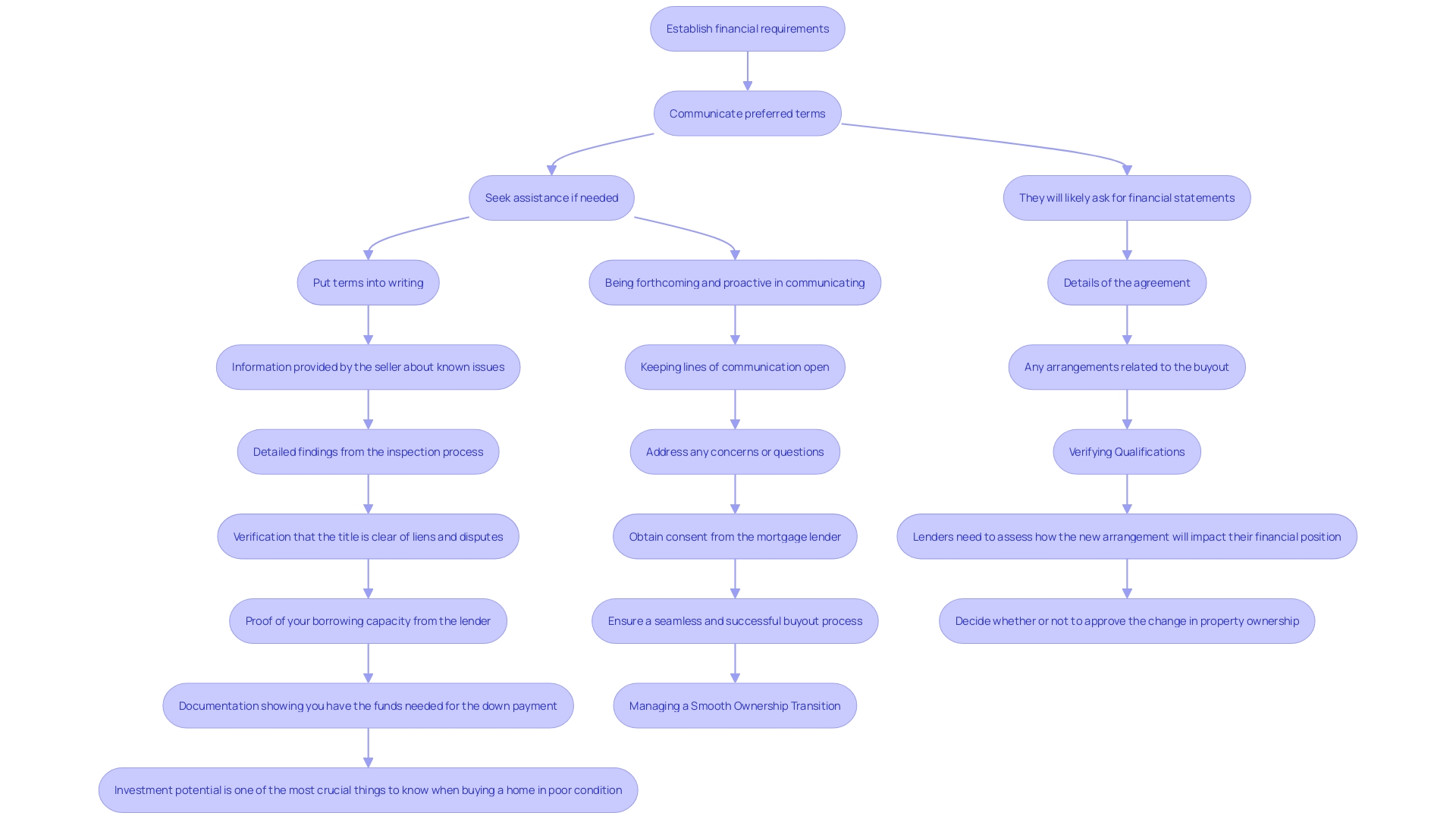
Conclusion
Seller financing has become a game changer in the estate and business sectors by offering distinct benefits to both buyers and sellers alike. This method not simplifies deals but also encourages a cooperative setting where terms can be customized to suit the individual requirements of all involved. With a grasp of principles, like loan arrangements and repayment plans people can confidently maneuver through the intricacies of seller financing.
Seller financing offers enticing advantages by providing sellers with the opportunity for transactions and a consistent revenue source from interest payments; simultaneously allowing buyers to experience more attainable ownership possibilities, with reduced initial payments requirements. Exploring misunderstandings regarding this financing approach illuminates its flexibility and the chances it affords individuals who might not meet conventional borrowing standards.
To succeed in real estate deals where sellers provide financing options upfront is key to success in this industry field of work to reach desired goals for both parties involved with proper guidance from experts like the team at Robbins Pellegrino, for support and advice on navigating these agreements effectively.
In a society that values flexibility and adaptability above all else accepting seller financing could lead to new opportunities. Through this method buyers and sellers alike have the chance to navigate successful deals turning obstacles into chances, for progress and development.




